- Home
- J. D. Rhoades
The Killing Look
The Killing Look Read online
THE KILLING LOOK
J.D. Rhoades
The following is a work of fiction. Names, characters, places, events and incidents are either the product of the author’s imagination or used in an entirely fictitious manner. Any resemblance to actual persons, living or dead, is entirely coincidental.
Copyright © 2021 by J.D. Rhoades
Cover and jacket design by 2Faced Design
ISBN 978-1-951709-49-5
eISBN: 978-1-951709-67-9
Library of Congress Control Number:
available upon request
First hardcover edition August 2021 by Polis Books, LLC
44 Brookview Lane
Aberdeen, NJ 07747
www.PolisBooks.com
To my good friend Terrence McCauley,
who inspired this departure from the usual
CHAPTER ONE
The over-and-under barrels of the little pocket gun were small, but they were pointed directly between Cade’s eyes, so he reckoned either one was sufficient for the job. He took a deep breath and willed himself to look behind those dark circles and into the sweating face of the young man who held the pistol. The fellow’s eyes were unfocused with the effects of the cheap whiskey Cade could smell—hell, almost see—coming off him. Even a drunk could pull a trigger, if only by accident, so Cade kept his breathing even and his outward manner calm.
The young man had come stumbling backward out of a deadfall, one of the hundreds of unlicensed saloons that infested the Barbary Coast. From the shouted command “and STAY out!” it was clear he hadn’t been leaving on his own accord. The ejection was accomplished with such vehemence that the young man crashed into Cade with enough force to nearly send both of them into the street. San Francisco had paved a lot of its streets, but a stumble into one of them would still likely leave a man cursing and scraping horseshit from his boots. Cade barely avoided that aggravation by shoving the drunkard off him, then teetering for a moment on the plank sidewalk before regaining his balance. When he straightened up, he found himself facing the man who’d stumbled into him.
The man wasn’t contrite. In fact, he seemed to take Cade impeding his retrograde progress as a personal affront. “Whyn’t you look where you’re goin’, you son of a bitch?”
Cade looked him over. He was a scrawny little cuss, dressed in a frock coat and bowler hat that both looked too fancy for the Coast. A young swell out slumming, no doubt. He looked game enough, but Cade figured, given his own height, weight, and sobriety advantage, he had little to worry about.
All of those calculations had gone out the window when the drunkard produced the derringer.
“Easy, son,” Cade said in a calming voice.
“I ain’t your son, you fucking…” That was all he had a chance to get out. As he spoke, he stepped forward, as if to press the pistol directly against Cade’s forehead. That amateurish attempt at intimidation cost him. Cade stepped in and swept his left arm up, then down, trapping the gun arm with his own. At the same time, he reached beneath his long leather coat with his right hand to draw his pistol from the holster on his hip. That combined movement quickly brought them face to face, with the barrel of Cade’s pistol jammed up under the drunk’s chin.
“You ever seen one of these, young fella?” Cade said in a conversational tone. The young man just stared at him, blinking in bleary surprise at the sudden reversal of fortune. The alcohol stench was stronger now, combined with the faint odor of puke. The youngster hadn’t been having his best night. Cade hoped he wouldn’t have to ruin it further.
“Colt Navy revolver,” Cade went on, fighting down his impulse to gag. “Funny how they call it that, seein’ as how it ain’t never been to sea. She’s a cap and ball pistol, so she’s a slow bitch to load, but six shots is enough to blow your addled brains up into the sky where,” he pressed the barrel harder against the man’s chin, forcing him to look upward, “you can commune with the angels, who might teach you some fuckin’ manners.” He smiled, a wolfish baring of teeth that drew a whimper of fear from the young drunk. “But I’ll tell you what, young’un. I’m in a generous mood. So, I’ll give you another choice, if you’re interested. You interested?” The dude nodded as best he could with that pistol barrel thrust against his chin.
“I thought you might. So here it is. You can choose to drop that peashooter, walk away, and don’t look back, and we’ll both go on livin’ long and happy lives. I won’t even ask you to say you’re sorry for being such a pathetic little pissant.” He pressed the revolver a little harder into the yielding flesh. “So, what’s your pleasure, son?”
Cade’s finger tensed on the trigger as he felt the muscles of the young man’s gun arm move, then relaxed as he heard the derringer clatter to the street behind him. He released the trapped arm and took a step back, then another, his pistol never wavering from the center of the man’s body. The young man looked at the derringer lying on the edge of the street, then back to Cade, as if measuring his chances at scooping it up. Cade just shook his head. The young man dropped his gaze like a whipped dog’s, then turned and walked away down the street, adjusting his waistcoat with all the dignity he could muster.
Cade shook his head and looked around. A few passersby had stopped to watch the scene, but the crowd was breaking up and shuffling off. Apparently, someone not being killed wasn’t much in the way of entertainment as far as the denizens of the Barbary Coast were concerned.
As Cade bent to pick up the derringer, a voice called out. “You there!”
He sighed. He probably should have expected that the confrontation would attract the attention of the local law. He slid his weapon back into its holster and dropped the derringer into one of the leather coat’s deep pockets. He turned slowly, hands raised in surrender. But it was no lawman standing there.
He saw a black lacquered carriage with gold trim and an open top. A man was standing up in the seat, gesturing to Cade. A black man in a formal suit and top hat sat in the driver’s seat, staring straight ahead. Cade looked around to make sure he was the one being summoned, then strode over to the carriage.
The man who’d waved him over was as short and slight of build as the young man Cade had just faced down, but he looked much better fed, and he carried himself with the demeanor of one used to being obeyed. He was dressed in a black frock coat and matching vest of a cut Cade hadn’t seen before. His face was round, and he sported a trim black mustache. The pale eyes that looked Cade up and down from their elevated position were bright and intelligent.
Cade touched the brim of his hat. “Afternoon, sir.”
“Good afternoon to you,” the man said. “May I have the honor of knowing who I’m addressing?”
“L.D. Cade is my name. And you’d be?”
“Hamrick,” the man said. “John C. Hamrick.” He seemed to savor the sound of his own name. “You’ve heard of me, perhaps?”
“Sorry,” Cade said, “I’m new in town.”
“Indeed. I must say, I’m impressed by the way you handled that young fool. I fully expected you to kill him.”
Cade shrugged. “No need. He wasn’t no killer. Just young and dumb and drunk.”
“Still. He had a gun pointed right at you. You would have been justified in shooting him.”
“Sorry to disappoint you.”
Hamrick shook his head. “Not disappointed at all. As I said, I’m impressed by your judgment. I’m thinking perhaps this isn’t the first such confrontation you’ve had to navigate.”
Cade didn’t answer.
Hamrick leaned forward; his eyes fixed on Cade’s. “Tell me, Mr. Cade, might you be seeking employment?”
The intensity of the look made Cade uneasy, but he was, in fa
ct, looking for work. “I could use a job, yes, sir. An honest one.”
Hamrick chuckled. “Don’t worry, Mr. Cade. I run an honest business. One that has room for a man of keen judgment such as yourself. A man with such judgment might go far in my employment.” He drew a gold pocket watch from his vest and peered at it. “I have pressing business at the moment, but I’d like to discuss this with you further. Do you know The Poodle Dog?”
The question startled Cade. “Come again?”
“The Poodle Dog. It’s a restaurant. The corner of Bush and Dupont Streets. Meet me there tomorrow at noon. Lunch will be on me, and we can discuss employment. Will you be there?”
Cade figured he could at least hear the man out. He’d expected San Francisco to be expensive, but in the week since he’d been there, his purse was getting light at a rate that worried him. A free meal was hard to turn down, and an offer of employment even harder.
“Yes, sir,” he said. “I’ll be there.”
Hamrick nodded to Cade, then to the driver. “Samuel.”
The black man didn’t look at Cade. He twitched the reins on the team of matched black horses and set them moving again. Cade watched the coach rattle away until it was lost in the traffic. Then he walked on, through the chaos and noise of the Barbary Coast.
He thought of the man’s offer. Clearly Hamrick had money, at least for now. Fortune was a tricky thing here, or so he’d heard. The girl who cleaned his room at the boarding house claimed she’d once made enough in silver shares to buy the place, but before she could close the deal, the vein played out, the share value collapsed, and she was back at work. San Francisco seemed like a good place for a man looking to make his fortune.
He’d drifted across the country since the war, doing this job and that, sometimes using the gun, sometimes using his strong back and hands, always in search of something he couldn’t name. Now he’d fetched up here, at the edge of the continent. If he wanted to move any further west, he’d have to hop a boat, and he didn’t care much for boats. So, whatever he was looking for, he’d best find it here.
CHAPTER TWO
Cade didn’t know what to expect from a restaurant calling itself The Poodle Dog, but what he found was a massive six-story pile of bricks at the corner of Bush and Dupont Streets, towering over the corner like a fortress. The impeccably dressed man at the front door looked Cade up and down with barely disguised contempt; Cade had had to borrow more suitable clothes for this place than the canvas trousers, work shirt, and worn boots he’d come west in. He’d finally prevailed on the Frenchman who had the room next door in his boarding house, a florid old sot who described himself as a “temporarily financially embarrassed aristocrat,” for something to wear that wouldn’t get him tossed out on his ear. Problem was, the old man was a good two inches taller than Cade, and fatter as well, so the clothes hung off him. He felt like a child putting on his daddy’s fancy clothes.
Before the well-dressed man at the door could deliver some cutting remark, Cade spoke up. “I’ve got an appointment with Mr. Hamrick.”
Cade may have never heard of Hamrick before yesterday, but in these parts, his was apparently a name to conjure with. Cade waited patiently as he watched the conflict play out on the man’s face between the reflex to pitch the shabby figure before him into the street and the need to placate the name of Hamrick. Finally, in a choked voice, the doorkeeper said, “Follow me.” Cade suppressed his smile as he fell in behind the man.
The interior of the place was designed to dazzle. Everything was trimmed in gold, and ornate paintings crowded with figures from myth and legend rose above the floor to the ceilings. He’d been in some saloons that aspired to this level of decorative refinement, but they fell far short of this riot of baroque ornamentation.
The doorkeeper handed Cade off to a short, round man with slicked-back black hair and a skinny mustache, whispering something in the waiter’s ear that sounded like “Hamrick.” That turned the waiter’s frosty demeanor to all smiles as he turned to lead Cade through aisles formed by an endless sea of white-clad tables. A few people turned to look at Cade as they passed. He felt their stares, but kept his eyes fixed straight ahead, concentrating on the shiny back of the waiter’s head as they turned out of the main room and down a short hallway. Cade was happy to be out of the public eye, but his tension returned as he was led up a staircase, then down a short corridor lined with doors. They passed a couple in the hallway, a man and a woman. The man looked down, not acknowledging the presence of anyone else. The woman eyed him appraisingly, then looked away, dismissing him and his shabby clothes as not being worth her further notice.
Finally, they reached a door at the end of the hallway. The waiter, still smiling, opened the door and motioned Cade inside. Cade entered, eyes scanning every corner of the room. He’d left the cavalry pistol at the house, but he’d pocketed the young dude’s derringer, just in case. His right hand slipped into his pocket to lightly grip the small weapon as he entered.
The room was empty, except for a table set with a white cloth and a glittering array of silverware. Hamrick was sitting behind the table, a crystal carafe at his left hand. He stood up as they entered.
“Mr. Cade,” he said. “I’m glad you came.”
“I said I would.” Cade took the seat that the waiter pulled out for him. Hamrick beamed at him, not seeming to notice the shabby clothing. “Welcome. And what would you like to drink? The wines here are the finest in the city.”
Cade didn’t know much about wine. “How’s the beer?”
“Also capital.” He nodded to the waiter, who bowed and moved off so quickly he seemed to disappear. “So,” Hamrick said, “how long have you been in San Francisco?”
“About a week.” The beer appeared in a hefty glass mug at Cade’s right hand. He took a drink. It wasn’t watered at all, a solid improvement over what he was used to.
“And what brings you here?” Hamrick peered at him over his wine glass.
“Rode in on the stagecoach.” He’d sold his last horse for passage and a stake for when he arrived.
Hamrick chuckled. “I meant, what business? Did you come for some purpose?”
Cade hadn’t realized how thirsty he was. He drained the last of the beer. “Not really. I’d heard of the place. Thought I’d give it a look.”
Another beer had arrived without Cade seeing the waiter who’d brought it. He decided to take this one a little slower. As he took a sip, the door opened and another waiter entered, pushing a cart upon which rested several dishes covered with gleaming silver domes.
“Since you weren’t familiar with the place,” Hamrick said, “I took the liberty of ordering for both of us. I think you’ll find the cuisine to your liking.”
It was. A massive beef roast, seasoned with herbs unfamiliar but savory-smelling, was the main attraction. The roasted potatoes on the side gave off an aroma that made Cade’s mouth water. He’d wanted to get right to a discussion of this job that Hamrick was dangling, but he was quickly distracted as he tucked into the feast. It wasn’t until he’d eaten over half of what had been set in front of him that he realized Hamrick, while taking a few leisurely bites himself, was regarding him with a benign smile that reminded him uncomfortably of someone watching a prize heifer being fattened for the slaughter. He set down his knife and fork and took the final swallow at the bottom of what he realized was his third mug of beer.
“Do I need to ask if you’re enjoying the meal?” Hamrick said.
“I am. Thank you, sir, for your generosity. But you wanted to talk about a job.”
Hamrick nodded. “I did. But first I’d like to discuss your provenance.”
“My what?”
Hamrick chuckled. “Your previous employment. Let’s start with the, ah, late unpleasantness.”
“You mean the war.” Cade was getting impatient at Hamrick’s mealy-mouthedness. The beer had his opinions straining to be released, but he held them tightly behind his t
eeth.
“Given the weapon you carry, I can’t help but ask if you were in the cavalry.”
“Yes, sir.” Cade said it without inflection. He’d long ago left behind the emotion of those days, the wild sense of adventure, the dreams of glory, the feeling of being part of something legendary. That feeling had died slowly as the bodies of both friends and enemies piled up along the way in places he’d never heard of before the war: Winchester. Cedar Mountain. Gettysburg and Yellow Tavern.
He shook his head to clear it. The past was dead and gone. That’s what he told himself. At least once a day.
Hamrick gratified him by not asking for stories of those days. The man did have the gift of forcing gratitude from you, despite your misgivings. “And after? Did you go home to…where is it that you said you were from?”
“I didn’t, sir,” Cade said. “I’m originally from Michigan. But I didn’t go back. Not for long, at least.” That sparked a new set of memories, even more vivid in Cade’s mind: the sting of a horsewhip across his shoulders, an angry voice raised, a girl’s voice pleading, “Just go, Levi, just go…” He put that memory aside. “I packed up and headed west.”
“And there you took up the profession of gunfighter.”
Cade looked down and sighed. When he looked up, he kept his expression neutral. “Sorry to disappoint you, Mr. Hamrick, but there really ain’t such a profession. Not outside the dime novels and cheap newspapers.” Seeing Hamrick’s disgruntled expression, he hastened to explain. “I wore a deputy’s badge a couple times when I was needed.” And when there was a salary to be had, he thought but didn’t say. “I rode shotgun on a couple of stagecoaches. I was an outrider on cattle drives…”
“And did you ever have to kill anyone?”
This again. Every time anyone saw the pistol, it came up. Children, men, sometimes even women who pushed him for stories with unsettlingly bright eyes.

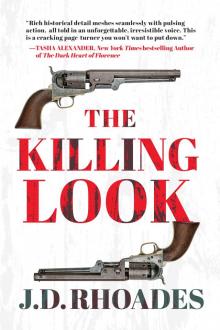 The Killing Look
The Killing Look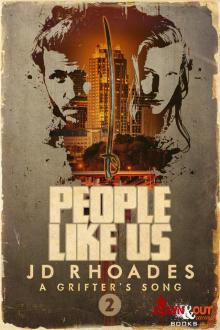 People Like Us
People Like Us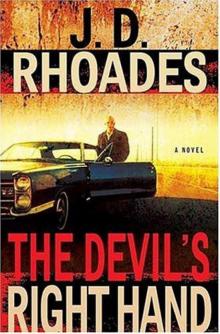 Jack Keller - 01 - The Devil's Right Hand
Jack Keller - 01 - The Devil's Right Hand Safe and Sound
Safe and Sound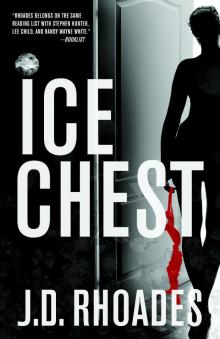 Ice Chest
Ice Chest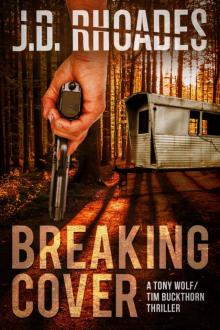 Breaking Cover
Breaking Cover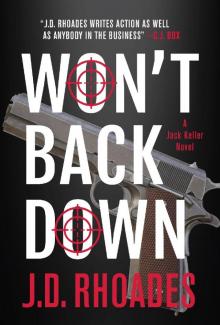 Won't Back Down
Won't Back Down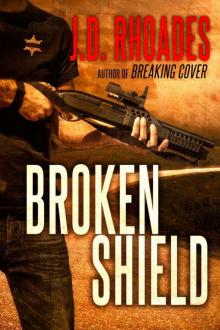 Tony Wolf/Tim Buckthorn - 02 - Broken Shield
Tony Wolf/Tim Buckthorn - 02 - Broken Shield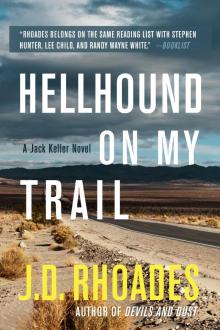 Hellhound On My Trail
Hellhound On My Trail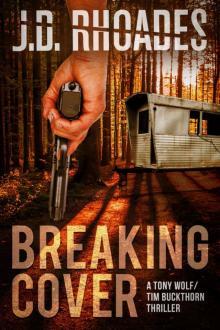 Breaking Cover (Tony Wolf/Tim Buckthorn)
Breaking Cover (Tony Wolf/Tim Buckthorn)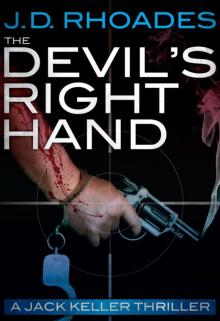 The Devil's Right Hand
The Devil's Right Hand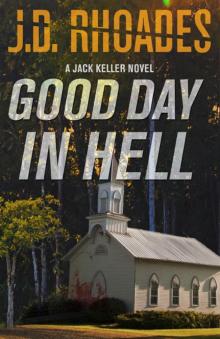 Good Day In Hell
Good Day In Hell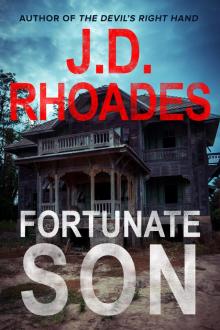 Fortunate Son
Fortunate Son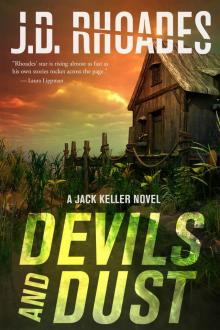 Devils and Dust
Devils and Dust